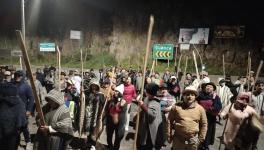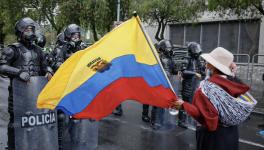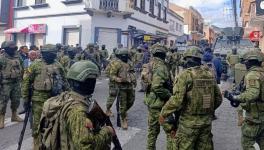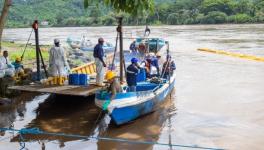A New Chapter in Ecuador’s Anti-Mining Struggle
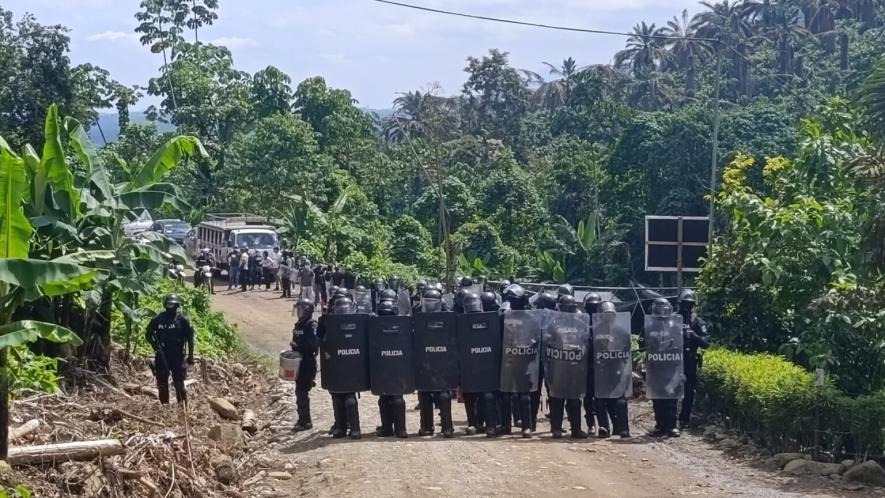
Heavily armed police repress anti-mining protests in Las Naves on June 26. Photo: CONAIE
Ecuador is a country that has developed a strong consciousness for environmental conservation throughout its history. Its constitution, approved in 2008, was a pioneer in the world in granting rights to nature. In 2021, more than 80% of the inhabitants of Cuenca, Ecuador’s third-largest city, voted in favor of banning mining there. In 2023, in a popular consultation, the Ecuadorian people demanded that the oil in the Amazonian Yasuní National Park be left in the ground.
The inhabitants of the country’s capital, Quito, also voted against the exploration and exploitation of metallic minerals in the Andean Chocó area. Mention should also be made of the numerous struggles that Indigenous peoples have waged for decades against the destruction of nature by large mining and oil companies.
Curimining and allegations of links with the Noboa family
The latest episode in this anti-mining legacy took place three weeks ago in the canton of Las Naves, Bolivar Province. The company Curimining S.A., following an agreement with the right-wing government of Daniel Noboa, announced that it would begin its activities in June with the construction of the El Domo mine, which aims to extract gold, silver, and zinc.
According to the announcement, the company will invest USD 292 million over a 22-month period and will offer royalties of more than USD 370 million, thus becoming the third-largest mine in the country, behind Fruta del Norte and Mirador.
One of the most controversial issues of the start of mining operations is that, according to several social organizations, including the Confederation of Indigenous Nationalities of Ecuador (CONAIE), one of the major shareholders of Curmining S.A. is the Nobis Group, a powerful conglomerate of companies dominated mainly by the family of the current president of the country. Given this, several social leaders have stressed that the operating permits were granted to favor the economic group to which the Noboa family belongs.
The popular organization of Las Naves and its neighbors
In early 2025, upon learning that Las Naves would become the epicenter of one of the largest mining operations in the country, hundreds of residents of the sector began to organize and demand that mining activities not be carried out on their land. They argue that mining operations endanger their water sources, which are not only indispensable for sustaining their fundamental economic activity (agriculture and livestock) but also for their daily consumption.
At the end of June 2025, major protests and mobilizations took place in Las Naves, involving not only the inhabitants of the area but also farmers from neighboring areas such as Ventanas, Echandía, San Luis de Pambil, Quimsaloma, and Pangua. The protesters argued that the consequences of the mining project could damage the environment and the thousands of families living there.
The National Anti-Mining Front, a social organization active in the struggle against mining, said in a statement: “Precincts, communities, associations, water boards, cocoa producers, ranchers, nurseries, traders and citizens in general mobilized in a single force to denounce the invasion of the mining company Curimining in the upper area of the canton, putting at risk the water sources where rivers are born that supply thousands of peasant families who are engaged in agriculture, livestock and tourism. Today, the people of Las Naves, but also Ventanas, Echandia, and San Luis de Pambil, Quimsaloma, Pangua, we said in one voice of resistance, MINING WILL NOT HAPPEN.”
The repression
This is not the first time that the residents of Las Naves have protested against mining. In July 2023, the government repressed the protests against the granting of the license to the company. In 2025, the presidency decided to repeat the script and protect Curmining’s interests, and opted for repression of the protesters. For several days, there were intense confrontations between farmers and traders in the area with specialized units of the National Police. Several videos show various protesters who were injured after the actions of the gendarmes.
On June 26, CONAIE reported on X: “Day 3 of repression in Las Naves. Heavily armed policemen from the Unit for the Maintenance of Order once again entered the La Union, Las Naves, by order of the mining company Curmining S.A., whose shareholder is the Nobis Group, linked to the family of President Daniel Noboa. The Government prioritizes the use of public force to protect the interests of a foreign company, criminalizing communities that defend water, territory, and their peasant economy.”
What is behind the events in Las Naves?
To better understand the situation, Peoples Dispatch spoke with Pamela Viteri, political scientist, lawyer, and left-wing militant, who affirmed that there was more behind what happened in Las Naves than what the official story says: “Behind it are the interests of the mining companies and the State that supports them. The Curimining mining company (Salazar Resources and Silvercorp) wants to impose the Curipamba – El Domo project by force, and the government, through police force and persecution, protects those interests. All this happens because mining is a business for the elites and for the politicians who are in power, such as President Noboa himself, who has very clear links with the sector, and specifically, in this concession.”
On the future of the anti-mining struggle in Las Naves, Viteri said, “The struggle is not over, it is still going on. The people have resisted strongly: there have been two points of resistance, caravans, and massive mobilizations. Although the police have brutally repressed, injuring protestors and carrying out arrests, the communities have not given up. Judicially, the protection actions were rejected, but the communities have appealed … The people continue to defend the water and the territory. Right now, there is tense resistance in the territory. They have not allowed all the machines they would like to enter, and that is thanks to the popular struggle … for more than a month and a half.”
When Viteri was asked about the broader meaning of the anti-mining struggle in Ecuador, she said: “What we are facing is not just a mining company, it is an entire extractivist model that despises peasant life, water, and the sovereignty of the peoples. A mode of accumulation that only serves the great interests of capital and that can only be sustained through blood, repression, and jail.”
“The future consists of staying organized, adding more strength, and not letting go of the territory. If we don’t stand firm, these companies will sweep us away. But the struggle of Las Naves has already transcended: now it is seen as an example throughout the country. The future lies in continuing to articulate with other anti-mining struggles, strengthening the organization, putting legal and social pressure, and not allowing us to be divided or bought. If the company and the State continue to violate rights, we will continue to resist. This struggle will not end until the mining company withdraws from the territory and the government looks for and listens to economic alternatives. The present and the future are anti-mining,” concluded Viteri.
Courtesy: Peoples Dispatch
Get the latest reports & analysis with people's perspective on Protests, movements & deep analytical videos, discussions of the current affairs in your Telegram app. Subscribe to NewsClick's Telegram channel & get Real-Time updates on stories, as they get published on our website.









